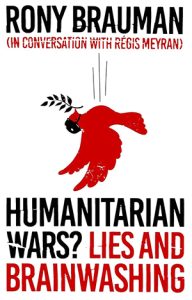Humanitarian Wars?: Lies and Brainwashing

Author: Rony Brauman (& Régis Meyran)
Translator: Nina Friedman
Publisher: Hurst Publishing
Year of Publication: 2019
Print Length: 120 pages
Genre: Essay, Non-Fiction / Political Science
Area: Libya, Somalia, Kosovo, Afghanistan, Iraq
Topic: Humanitarian Action & Humanitarianism, Ethics & Society, Politics & Power, Biopolitics, Medicine & Healthcare, Military, Civil War, War; Law, Jurisprudence, Legal Theory; Law Enforcement, International Humanitarian Law, United Nations
The former president of MSF offers a trenchant critique of the politicisation of humanitarianism, such that it is now used to justify war.
In the eyes of Rony Brauman of Médecins Sans Frontières, wars are always triggered in the name of morality. Today’s ‘humanitarian’ interventions are little more than new moral crusades—and their justifications are based on lies. There are plenty of examples of hawkish propaganda in recent years: Saddam Hussein’s mythical weapons of mass destruction; dubious predictions of genocide in Kosovo; doctored figures of famine in Somalia; and a fake massacre of protesters in Libya.
Without being militantly non-interventionist, Brauman is extremely suspicious of the thirst for war displayed by many of today’s world leaders, the consequences of which are devastating. He is critical of international peacekeeping bodies and tribunals: for him, the UN Security Council and the International Criminal Court represent the interests of the powerful above all else.
Basing his argument on the criteria for a ‘just war’, Brauman criticises the Western obsession with imposing democratic values by force. In this sober and convincing book, he thoroughly dismantles the notion of the justness of ‘humanitarian wars’.
Table of Contents
Foreword (Régis Meyran)
1. What do we mean by “just wars”?
The criteria that have defined “just war” since Thomas Aquinas are intended to limit both the reasons for going to war and the methods employed. The UN recycled them in 2005 under the “Responsibility to Protect” doctrine.
2. Using “alternative facts” to justify war: the case of Libya
The propaganda leading up to the 2003 Iraq invasion, which centred on “weapons of mass destruction”, did not convince people outside the United States. In contrast, the equally false allegations against the Gaddafi regime had majority support in France, including among those who mocked America’s gullibility.
3. Somalia: the first humanitarian war
Somalia was the laboratory where the UN tested its first militarized rescue operation. A famine was wreaking havoc in the midst of civil war and drought, but armed force was not the only possible response.
4. Kosovo: a morally justified unjust war?
Europe had legitimate reasons for opposing a violent ethnic-based power on its soil, but the diplomatic conference convened for that purpose appears to have been just window dressing for the American push for war.
5. Afghanistan and Iraq: two wars “for civilization”
While an army is the right tool for fighting another army, it is not the appropriate way to start a democratization movement. Yet that is what we continue to expect, using women’s bodies as an indicator of progress.
6. International humanitarian law: legal pipe dream and the language of power
Since the late nineteenth century, pacifists have viewed humanitarian law as a means for making war acceptable, and thus more likely. The recent development of killer robots and other “smart weapons”, presented as “humanitarian progress”, demonstrates the prescience of their critique.
Notes

Rony Brauman is the Director of the Humanitarian and Conflict Response Institute, Paris. He is the former president of Médecins Sans Frontières, his books include La Médecine humanitaire. He is a doctor with a degree in epidemiology and tropical medicine. After working for several years as a doctor in the field, mainly in conflict situations and refugee camps. He was a lecturer (1992–2000) and then associate professor at Sciences Po Paris, and professor at the Humanitarian and Conflict Response Institute (HCRI), University of Manchester (UK) (2003–2015).
Source: https://normandiepourlapaix.fr/en/personnes-structures/brauman
More from Rony Brauman in this library, click here.
